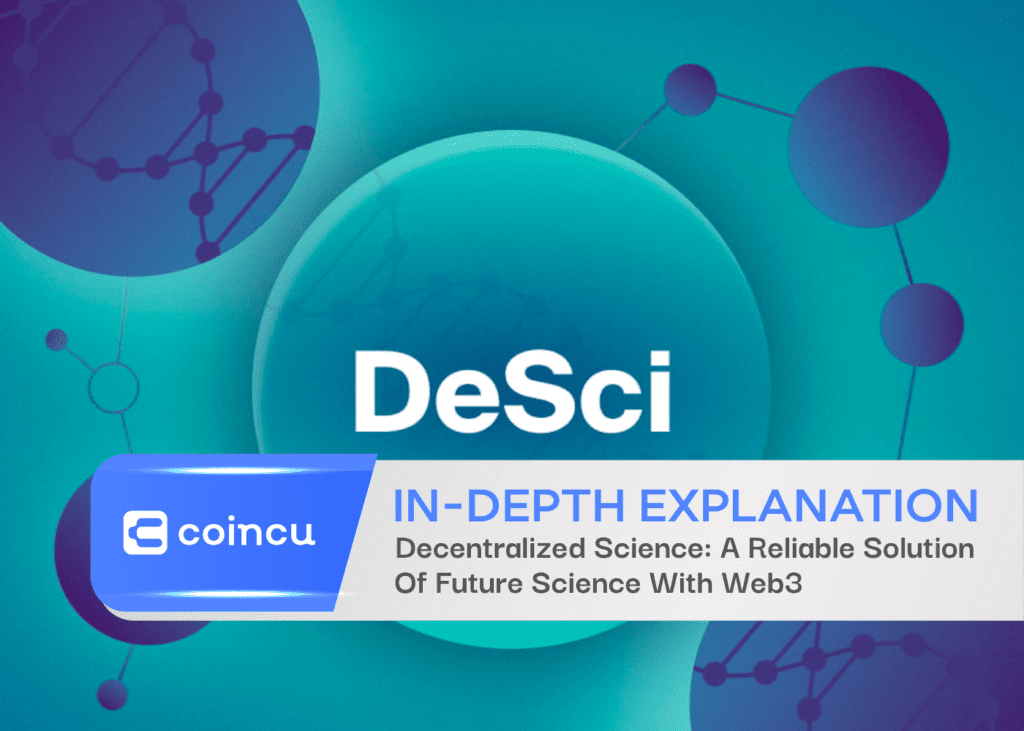The new decentralized science (DeSci) movement is exciting and is seen as a potential answer to many problems that traditional science has been trying to solve. But what motivates it, and how precisely might it advance scientific knowledge?

Web 3.0 has shown a tremendous ability to revolutionize a variety of industries, including but not limited to social media, gaming, the creative economy, and even environmental protection.
The development of Web3 technologies like NFTs and DAOs has had a significant influence on science as well, which is how the revolutionary idea of decentralized science, or simply DeSci, came to be.
What is decentralized science (DeSci)?
With the help of cutting-edge tools and technologies like blockchain, non-fungible tokens (NFTs), decentralized autonomous organizations (DAOs), crypto tokens, and smart contracts, decentralized science is a Web3 movement whose main objective is to modernize traditional science and offer a fully-fledged public infrastructure for scientific research, publication, and funding.
DeSci aspires to provide an environment where researchers are encouraged to freely share their work and earn credit while making it simple for anybody to access it and contribute to it. DeSci is based on the premise that all people should have access to scientific information and that scientific research should be conducted in a transparent manner.
The scientific research paradigm being developed by DeSci is more decentralized and dispersed, making it more resistant to censorship and government control. By decentralizing access to money, scientific resources, and communication channels, DeSci aims to foster an atmosphere conducive to the development of novel and innovative ideas.
More financing options (including DAOs, quadratic contributions, crowdsourcing, and others), easier access to data and methodologies, and incentives for reproducibility are all made possible by decentralized science.
DeSci is working to create a community where anyone can easily share their scientific work, as well as access other members’ research and contribute to it. Importantly, decentralized science aims to give a distributed scientific research paradigm that is censorship-resistant as well as more varied financing sources.
The benefits of decentralized science
DeSci delivers a number of important benefits that can improve and democratize conventional science in a number of ways, as well as support scientists’ and researchers’ day-to-day endeavors.
Providing funding opportunities
In the past, obtaining money for scientific research has been a top-down, tedious, and unduly bureaucratic procedure that necessitated the participation of a panel of reputable people from specialized funding agencies.
In addition, capital is becoming difficult to come by, and the funding market is very competitive. That is why a lot of good projects and ideas quit the bidding process at the beginning. While this is going on, financing is given to initiatives that senior stakeholders—who may be significantly biased—have selected and prioritized.
By implementing high-end financing techniques where the distribution and allocation of cash will be decided by the public, Web3 can, however, reverse the situation and lessen dependency on public or institutional funding. Decentralized autonomous groups and quadratic and retroactive financing techniques are two examples of this.
Platforms for crowdfunding that use blockchain technology also make it easier and faster to raise the required cash without the need of middlemen. Additionally, the introduction of tokens in DeSci makes it simple to finance scientific initiatives and research, stimulating innovation and making it possible for anybody to invest in science.
Ensure the safe preservation of scientific data
Blockchain technology enables the development of open, censorship-resistant, secure, and immutable databases in DeSci that are very difficult to tamper with. Because all modifications to the data would be available to the public, all research data, scientific discoveries, and publications could be safely preserved on the chain with no concerns about their veracity.
Enhance collaboration
The scientific community may be strengthened and brought together with the help of DAOs, which also enable open, productive communication among all participants.
DAOs are a more practical and cutting-edge alternative to conventional scientific and research organizations in decentralized science. These emphasize creating an engaging and democratic atmosphere where everyone may have access to and contribute to research resources and materials and, in essence, have their views heard.
The DeSci landscape now has a wide range of DAOs, each of which serves the requirements of a particular research area, such as peer review or project finance. It is noteworthy that DAO members can get awards for substantial contributions to the community, such as serving as co-founders, advisers, or partnering organizations. This will motivate them to continue contributing to community growth and knowledge base accumulation.
Additionally, the DAO-supporting smart contracts can make a significant improvement to the peer review process. The problem nowadays is that peer review is typically performed for free by academics, editors, and reviewers, while publishing firms make huge sums of money from it. Instead of using middlemen, authors may interact directly with peer reviewers and pay them for their work thanks to self-executing smart contracts.
Protecting intellectual property rights
It appears that non-fungible tokens are more diverse than merely images, movies, and GIFs… In reality, in the DeSci environment, NFTs have the capacity to protect intellectual property.
To guarantee the validity and demonstrate the credentials of tokenized scientific assets or data such as research findings, journals, and so forth, intellectual property NFTs, sometimes known as merely IP NFTs, can be developed.
Additionally, in specialized blockchain-based marketplaces, intellectual property NFTs may be sold in a transparent and secure manner. No outsiders will be required to assist interested parties in buying an IP NFT.
How does decentralized science work?
Science might be revolutionized by blockchain technology, which also has the power to challenge many of the antiquated processes we just outlined. Decentralized research, for one, does away with the need for gatekeepers and enables scientists to operate more freely, sharing their expertise with the community and encouraging more cooperation. It goes without saying that this might perhaps open the door for further advancements that are even more significant.
Researchers may create open, unchangeable, undeletable, and censorship-resistant databases using blockchain, which can also serve as an accurate record of who owns whose scientific discoveries.
Anybody may become a patron or investor thanks to the creation of tokens in decentralized science, which can be a useful tool in helping finance initiatives. This lessens the reliance of science on institutional funding or public resources.
The ecosystem as a whole may be significantly impacted by the use of smart contracts for scientific research and development.
Additionally, there are DAOs that accelerate scientific investigation at the nexus of all three of these technologies by leveraging the power of the community. DAOs may be incredibly beneficial for advancing research and highlighting under-researched topics.
Conclusion
DeSci is fast establishing itself as a dependable alternative to how conventional science operates by giving researchers and scientists access to financing options, more open peer-review processes, and paths for more control over scientific data and intellectual property.
Decentralized research uses blockchain-based technologies like smart contracts and tokens for this, with the goal of advancing science and making discoveries that were formerly considered to be decades away, if not totally unachievable.
DISCLAIMER: The Information on this website is provided as general market commentary and does not constitute investment advice. We encourage you to do your own research before investing.
Join us to keep track of news: https://linktr.ee/coincu
Harold
Coincu News





